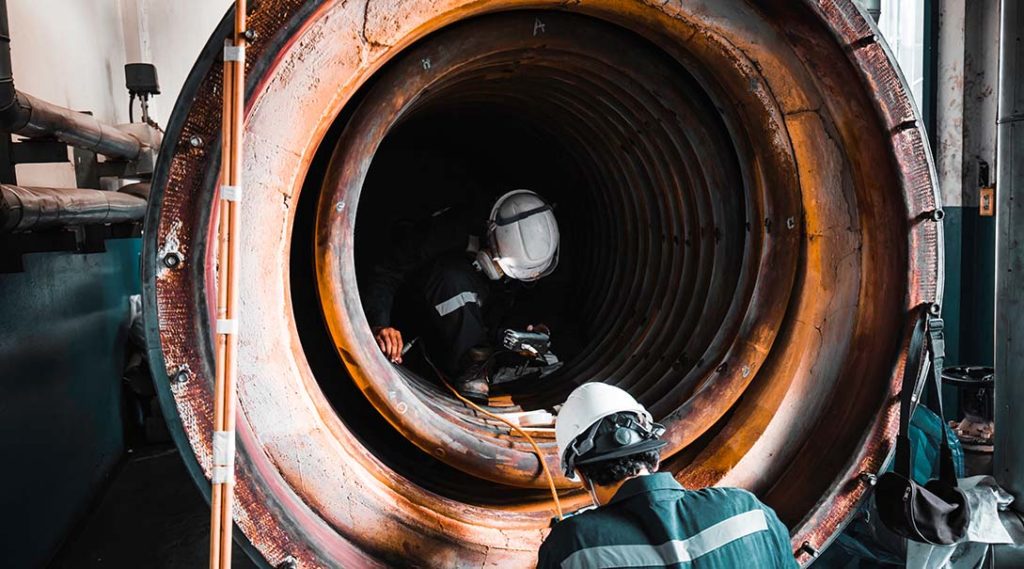The power plant industry requires rigorous safety protocols across all sectors, including nuclear, coal, gas, turbines, and others. These protocols protect employees and workers from potential incidents which could result in serious injury or death. These hazards can range from respiratory risks to potential fires or explosions.
Providing employees with the proper protocols and power plant safety training minimizes the risk of incidents and protects them if they occur. Therefore, employers need to understand how to effectively provide their team with power plant safety training to help protect their workers.
Power Plant Safety
Due to the potential power plant hazards that can occur, power plant safety training is a crucial part of getting a power plant up and running. As a result, many companies and organizations have increased the number of requirements and regulations for a power plant. However, hazards are still present.
Power plant safety training is another particularly effective and efficient way of protecting employees. Training of employees includes educating workers on potential hazards and risks of working at a power plant.
Many companies offer power plant training courses to limit power plant hazards. For many companies, this means:
- protecting employees by keeping the proper emergency supplies handy,
- holding safety meetings frequently,
- following recommendations, and
- making plans for a potential emergency.
But, above all else, companies must provide their employees with the proper training and information regarding any potential hazards.
HSI’s Power Generation course works with employees to cover general safety practices for working in electrical power generation plants. It helps to break down what workers must fulfill in their everyday work and provides the proper power plant training if a hazard were to occur.
Common Power Plant Hazards
The facility will often determine the type of power plant hazards that can arise, such as electrocutions, falls, confined spaces, fires, explosions, and environmental stress. Many companies engage in power plant training courses to protect their employees from these hazards to ensure power plant safety.
When working in a power plant, many employees will often face potentially being electrocuted. The CDC provides an electrical safety manual for workers, including training on:
- how a shock is received,
- the impact of a shock,
- the dangers of a shock,
- treating a shock, and
- preventing a shock
The National Institute for Occupational Safety and Health (NIOSH) also provides reports on incidents that have occurred in the past with other power plant workers. Reading up on these incidents and protocols can help prevent future power plant hazards through power plant safety training on electrocution.
Fires and explosions are other frequent incidents that can occur. Due to the heightened electric circuits that run through power plants, fires and explosions often occur, posing largely as power plant hazards.
Power plant workers should be educated on the dangers of fires and explosions through safety training. To assist, OSHA provides workers with information and training on fire safety and pressure vessels to minimize power plant hazards that may come from fires and explosions.
Another relevant hazard is environmental stress, which can often arise from chemical hazards. Due to the confined spaces and mass use of chemicals, workers are often exposed to these potentially deadly substances. Power plant training courses provide employees with the opportunity to learn how to use equipment, such as PPE, which could protect them if exposed to hazardous chemicals.
These courses also expose employees to the potential dangers and educate them on what to do if someone is exposed to toxic chemicals. OSHA provides this information to protect employees and employers from potential damage that may occur from chemical exposure.
The Benefits of Training Courses
Providing power plant workers with safety training allows workers to be better prepared for potential hazards to protect themselves and others better. It also allows them to avoid these potential problems by troubleshooting ahead of time to fix issues that may arise.
Having employees who have been effectively trained helps the plant operate more effectively and without error. Without potential hazards, the plant can run smoothly and avoid potential issues among workers.
Courses such as HSI’s explain to workers how to properly guard energized equipment and energized parts. It also helps teach them how to work with equipment such as steam boilers, chlorine, ash, and coal, which could pose as power plant hazards.
While in training, workers also learn Which PPE (personal protective equipment) is appropriate for each job, allowing them to proactively protect themselves. They also learn the proper way to use the equipment they have been given.
They can then recognize the signs of potential danger and what steps to take to keep themselves safe if it occurs. They also learn how to repair broken equipment, which can cause a hazard. These components provide employers with the trust that their employees can function efficiently and safely within the power plant, due to the power plant safety training.
Safety and Training Opportunities
Overall, employers should strive to protect their employees from potential hazards through effective power plant safety training. They can do this through enhancing protocols, holding frequent safety meetings, and offering operator training and certification programs, operator training, and training courses.
To continue discussing safety training courses for power plants and the energy sector, contact Salvation Safety to get started. Safety is paramount to the proper operation of a power plant, so don’t delay, reach out to our team today.





